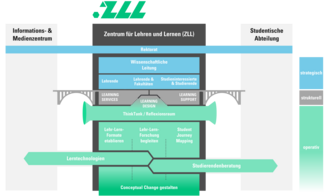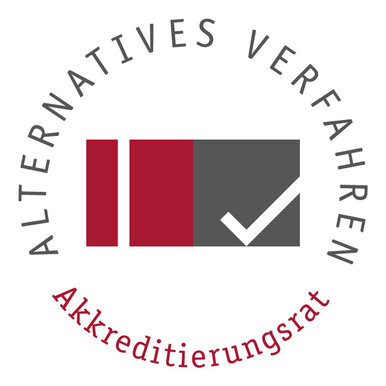High-quality education is our incentive
At Furtwangen University, we're passionate about providing students with the knowledge they are curious about, which will help them advance in their future careers and make them the sought-after specialists of tomorrow.
At HFU, we've set up our own Center for Teaching and Learning, which ensures that we live up to our quality standards and continue to develop them.
Responsibilities
The "Center for Teaching and Learning" (ZLL) is an academic institution of HFU founded in 2022. It bundles the diverse and extensive range of services to support teachers in the design and implementation of teaching and accompanies learners in a variety of ways as part of their student journey. The "Center for Teaching and Learning (ZLL)" aims to support an open, experimental, innovative and active teaching and learning culture at HFU.
Open The ZLL openly advocates an open teaching-learning culture towards different teaching and learning methods and forms. In an open teaching-learning culture, different teaching and learning methods coexist without prejudice and mutually benefit from shared critical and evidence-based discussion. In doing so, ZLL also shows openness in its organisation and integrates teachers with learners with the goal of openly discussing, designing and evaluating teaching and learning in a rapidly changing environment.
Experimental The ZLL provides access to good teaching in an experimental way. In doing so, the ZLL supports the testing of new teaching and learning formats and their joint reflection.
Innovative The ZLL has an innovative attitude towards findings from teaching-learning research and the practical implications of subject teaching methods, thus transferring new theoretical findings into teaching practice.
Active The ZLL encourages the active involvement of all interested teachers and learners and facilitates a broad exchange of experiences. The teaching and learning approaches that the ZLL will introduce to HFU in order to anchor, promote and continuously develop future-oriented teaching at HFU also play an activating role.
Target groups
The diverse initiatives of the "Center for Teaching and Learning (ZLL)" address different interest and target groups within HFU.
- Teaching staff The ZLL supports teaching staff in the development, implementation and further development of contemporary and innovative teaching.
- Learners The ZLL supports learners through the various stages of the Student Journey, from the first semester to graduation.
- Faculties The ZLL supports faculties in the (further) development of study and continuing education programmes.
Reflection space The ZLL provides all stakeholders with a reflection space for open exchange about experiences in teaching and learning, so that we can learn and benefit from each other thus together further developing HFU as a modern, attractive and leading university in the south-west.
Structure

Structure of Center for Teaching and Learning
As the youngest scientific body at HFU, ZLL is still being set up. We have a clear idea of what we want to achieve - to support teachers and learners in the best possible way, to further develop teaching and learning concepts together with them, and support the exchange of experience.
The ZLL will work closely, not only with the directly addressed target groups, but also with the Information and Media Center and the Student Affairs Department at HFU.
- Learning Services The Learning Services department has been successfully established for many years. Its innovative teaching and learning technologies and targeted support help our teachers to tailor their teaching to the needs of our students and the respective subject area.
- Learning Support In the future, the ZLL would like to expand and make more visible the diverse counselling opportunities for learners in the Learning Support Department. The initiatives, which are already actively used today, will be expanded, offering centralised yet personal counselling.
- Learning Design The area of Learning Design is intended to support faculties and teachers in developing and testing new approaches to teaching and, if successful, to disseminate them widely. The aim is to establish the conscious design of teaching and learning at HFU and to support the acquisition of third-party funding in the field of modern teaching.
Teaching excellence
HFU Teaching prize
The HFU Teaching Prize is awarded to teachers of the university and aims to support qualitative, innovative teaching in a sustainable manner. Both professors and lecturers of HFU can be nominated for the prize.
The prize is awarded annually and the winner is decided by means of the following multi-step process:
Every semester students nominate courses for the HFU Teaching Prize.
Step 1: All students who attend the nominated course have the opportunity the evaluate the course using various criteria (topicality and quality of teaching content, innovative teaching approaches, supervision and support in the course, teacher's personality, teaching style).
Step 2: The courses which come out top in these student evaluations are then reviewed by a commission made up of internal and external advisors who select the winner using further criteria (learning outcomes, teaching concept, use of e-teaching elements, assessment of learning progress, diversity, sustainability).
Any course which has been awarded the HFU Teaching Prize is ineligible for nomination for the next 2 semesters. A course can only be awarded with the HFU Teaching Prize a maximum of 3 times.
The HFU Teaching Prize, which was initiated in the winter semester of 2014/2015 and is the successor to the HFU e-Teaching Award.
Accreditation of study programmes
The quality of a study programme is confirmed through accreditation. Basically either the individual study programmes are accredited (programme accreditation), or the quality assurance system of the whole university (system accreditation). HFU decided upon the latter.
Certified study programmes
With its system accreditation the university proved to the Accreditation Council that it has a highly developed and effective quality management system. With this, the university can itself develop and certify study programmes which meet the European and national requirements of the the Standing Conference of the State Ministers of Education and Cultural Affairs in Germany, the German Rectors' Conference and the Accreditation Council. The University is itself responsible for regularly checking and developing the study programmes. At HFU this is carried out by means of a complex peer review procedure with internal and external specialists with which all study programmes are regularly certified.
Pioneer
Furtwangen University was one of the first in Germany to take these steps. In 2020 it went one step further becoming one of the first universities again to introduce an alternative accreditation procedure with an Advisory Board model. The Quality Advisory Board of external members advises the University on its QMS on an ongoing basis. This is the most advanced form of quality assurance system at European universities.
ZLL news
Unfortunately, there is currently no news that we can display here. Click here for the news archive.



